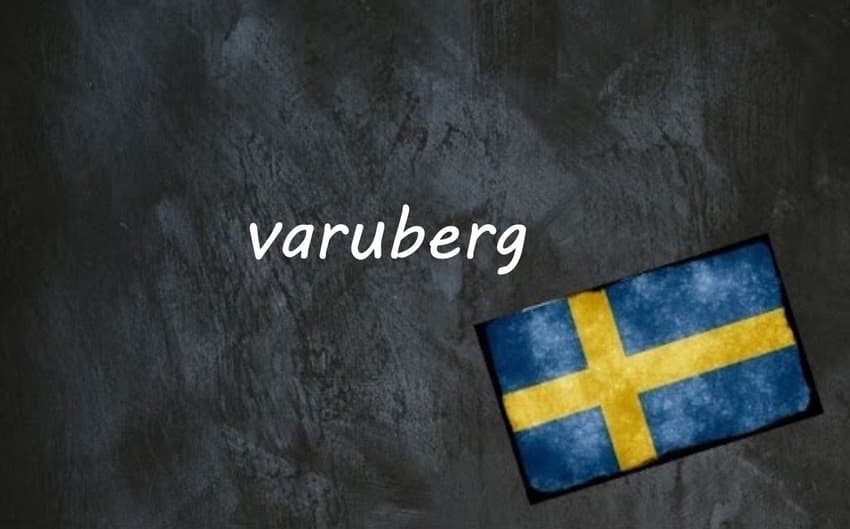Swedish word of the day: varuberg

Understanding this peculiar word will help you to avoid accidentally alienating people in Sweden.
Varuberg is one of those concepts that doesn't have a snappy translation in many other languages. It refers to a heap of items piled up on a supermarket conveyor belt, and is a big no-no when shopping in Sweden.
Perhaps you've already learned that berg means "mountain" (from the Old Norse word bjarg), but it also means "heap" or "pile". Meanwhile, varu- comes from the noun vara, which means "product"; an item being bought or sold. So varuberg is basically "mountain of goods".
You can hear it used in general, for example to describe large shopping displays or the items in someone's cart/trolley, but it's most often used to talk about how people arrange their goods on the conveyor belt before paying.
You usually hear varuberg combined with the verb bygga (to build) rather than göra (to make) – and it's often preceded by inte (don't) since most Swedes agree that the preferred way to arrange your shopping is in a neat line.
- Don’t miss any of our Swedish words and expressions of the day by downloading The Local's new app (available on Apple and Android) and then selecting the Swedish Word of the Day in your Notification options via the User button
You might be tempted to roll your eyes at the concept of a varuberg and chalk this up to Swedes loving conformity and rule-following, but some studies have shown that a varuberg can actually be a health issue for checkout staff. It delays the checkout process, since staff need to dismantle the "mountain" and scan each item one by one, and these repetitive motions can, over time, cause damage to their muscles and shoulders.
So while this isn't exactly one of the most common words in the Swedish language, it's very handy to know in order to avoid hearing it mumbled passive-aggressively by shoppers queuing behind you.
Examples
Vänd streckkoden mot dig och bygg inte varuberg
Turn the barcode towards yourself and don't pile up your items
Varuberg kan skada personal
Mountains of piled-up goods can injure staff
Villa, Volvo, Vovve: The Local’s Word Guide to Swedish Life, written by The Local’s journalists, is available to order. Head to lysforlag.com/vvv to read more about it. It is also possible to buy your copy from Amazon US, Amazon UK, Bokus or Adlibris.
Comments
See Also
Varuberg is one of those concepts that doesn't have a snappy translation in many other languages. It refers to a heap of items piled up on a supermarket conveyor belt, and is a big no-no when shopping in Sweden.
Perhaps you've already learned that berg means "mountain" (from the Old Norse word bjarg), but it also means "heap" or "pile". Meanwhile, varu- comes from the noun vara, which means "product"; an item being bought or sold. So varuberg is basically "mountain of goods".
You can hear it used in general, for example to describe large shopping displays or the items in someone's cart/trolley, but it's most often used to talk about how people arrange their goods on the conveyor belt before paying.
You usually hear varuberg combined with the verb bygga (to build) rather than göra (to make) – and it's often preceded by inte (don't) since most Swedes agree that the preferred way to arrange your shopping is in a neat line.
- Don’t miss any of our Swedish words and expressions of the day by downloading The Local's new app (available on Apple and Android) and then selecting the Swedish Word of the Day in your Notification options via the User button
You might be tempted to roll your eyes at the concept of a varuberg and chalk this up to Swedes loving conformity and rule-following, but some studies have shown that a varuberg can actually be a health issue for checkout staff. It delays the checkout process, since staff need to dismantle the "mountain" and scan each item one by one, and these repetitive motions can, over time, cause damage to their muscles and shoulders.
So while this isn't exactly one of the most common words in the Swedish language, it's very handy to know in order to avoid hearing it mumbled passive-aggressively by shoppers queuing behind you.
Examples
Vänd streckkoden mot dig och bygg inte varuberg
Turn the barcode towards yourself and don't pile up your items
Varuberg kan skada personal
Mountains of piled-up goods can injure staff
Join the conversation in our comments section below. Share your own views and experience and if you have a question or suggestion for our journalists then email us at [email protected].
Please keep comments civil, constructive and on topic – and make sure to read our terms of use before getting involved.
Please log in here to leave a comment.